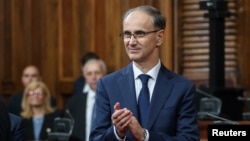Djuro Macut became the most searched name in Serbia on April 6 after President Aleksandar Vucic nominated him for the position of prime minister.
"I believe he will bring a different kind of discourse into our public life and help ease tensions. I also think he will do many good and important things for our country," said Vucic.
The tensions he referred to prompted the resignation of Prime Minister Milos Vucevic in January after three months of student-led protests across Serbia.
Demonstrators have demanded accountability, accusing the government for corruption and poor oversight of the railway station reconstruction after 16 people were killed in a roof collapse in the city of Novi Sad in November.
Who Is Djuro Macut?
Macut (62) is one of the leading experts in Serbia in the field of endocrinology, the study of hormones. He earned his medical degree, his master's degree, and a PhD in Belgrade, where he was born.
Macut is the deputy director of the Clinic for Endocrinology at the University Clinical Center of Serbia and a full professor at the University of Belgrade. He also teaches in Athens and Skopje.
Macut serves as president of the Serbian Society for Reproductive Endocrinology and is internationally recognized for his expertise on polycystic ovary syndrome (PCOS). He is a board member of the European Society of Endocrinology.
In 2024, Serbian President Aleksandar Vucic awarded him the Order of the Karadjordje’s Star, Second Class, for his work and contributions to Serbia. It is the third-highest state honor in Serbia.
He is a member of the Steering Committee for the establishment of the Movement for People and the State, initiated by Vucic. It is a new political movement centered around Vucic's ruling party, though details on how it will operate remain scarce. Vucic has said the movement "calls on honorable citizens to contribute to Serbia with their skills and knowledge and help make it the most successful in its history."
Macut's Prescription
In the first address to the parliament on April 15, Macut said youth-led protests are a natural expression of dissent but criticized tactics such as road and school blockades.
"When you deny others the right to education and movement, you become a usurper of others' freedoms," he said, pledging to support youth engagement -- but only within legal and constitutional framework.
He pledged to reopen universities, saying Serbia is "tired of blockades and divisions."
He vowed to maintain Serbia's current foreign policy direction and reaffirmed continued support for ethnic Serbs in Kosovo. Since Kosovo's 2008 declaration of independence, which Serbia still rejects, there have been ongoing tensions between the two countries.
These tensions primarily revolve around ethnic Serbs in northern Kosovo, who reject Pristina's authority and have tried to maintain parallel governance structures with Belgrade's support. The European Union has led the dialogue between two countries since 2011, aiming to normalize their relations.
Other Cabinet Members
There are 10 new faces among 30 proposed cabinet members.
The new education minister nominee, Dejan Vuk Stevanovic, is the only professor at the Faculty of Teacher Education who publicly opposed the student-led blockade from the start.
A frequent guest on pro-government media, he has criticized both professors and students who are demanding accountability for the Novi Sad tragedy.
The new nominee for information minister, Boris Bratina, is widely known for his anti-European rhetoric and for advocating a ban on the Pride Parade.
He was filmed shouting "Serbia and Russia -- we don't need the European Union!" at a Belgrade rally in 2009, where he also burned the EU flag. Serbia officially maintains that joining the European Union, its biggest investor, remains its strategic goal.
"I don't have an entirely positive view regarding the EU, and perhaps that's where I differ from others. I wouldn't encourage excessive enthusiasm about the EU, as it has plenty of problems of its own," Bratina told RFE/RL's Balkan Service on April 14.
The opening of new chapters in Serbia's EU accession negotiations has been stalled since December 2021.
Bratina has called Pride "a procession of the sick" and said such events don't belong in what he described as Serbia's "deeply heterosexual culture." Belgrade Pride has demanded the withdrawal of his nomination.
Like his potential future boss, Bratina is a member of the Movement for People and the State.
What Can We Expect From Serbia's New Government?
Members of the opposition and analysts do not expect major changes in domestic policy or Serbia's international stance as the country continues to refuse joining Western sanctions against Russia over the invasion of Ukraine and maintains historical and cultural ties with Moscow.
Serbia is also likely to remain China's preferred partner in the Balkans and continue their "iron friendship," as Vucic describes relations with Beijing.
"The fact that the new PM [designate] is a member of Vucic's newly formed movement already shows he is not a politically independent candidate," says Zoran Stojiljkovic, a professor at the Faculty of Political Sciences in Belgrade.
"That choice clearly suggests he will be a kind of 'political figurehead,' as he lacks significant political experience and does not guarantee autonomy from the president of Serbia," Stojiljkovic adds.
On April 6, Serbian Parliament Speaker Ana Brnabic called prime minister-designate "brave, calm, and stable -- everything the Serbian government needs right now." Outgoing PM Milos Vucevic added that Macut is someone "who can open a social dialogue."
But some opposition leaders dismissed the appointment as symbolic.
Dragan Djilas of the Freedom and Justice Party said Vucic is "buying time" by nominating someone who "won't choose ministers, shape policy, or make decisions."
The Serbia Center party added that it "doesn't matter who heads the government when it's clear Vucic is in charge."













